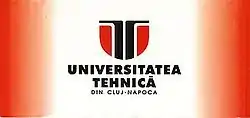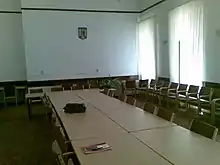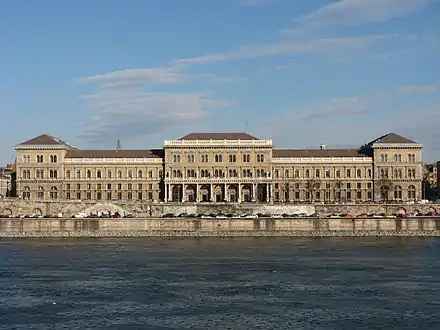Technical University of Cluj-Napoca
The Technical University of Cluj-Napoca (UTC-N short for Romanian: Universitatea Tehnică din Cluj-Napoca) is a public university located in Cluj-Napoca, Romania. It was founded in 1948, based on the older Industrial College (1920). Technical University of Cluj-Napoca is classified by the Ministry of Education as an advanced research and education university.[2] The University is a member of the Romanian Alliance of Technical Universities (ARUT).[3]
Universitatea Tehnică din Cluj-Napoca | |
 | |
| Latin: Universitas Technica Napocensis | |
Former names | Cluj Institute of Mechanics (1948–1953) Polytechnic Institute of Cluj-Napoca (1953–1992) |
|---|---|
| Type | Public |
| Established | August 1948 1937 - Electromechanical College 1920 - Industrial College |
Officer in charge | Mirela Boțan |
| Rector | Vasile Țopa |
Academic staff | 917 |
| Students | 20,786 (2018)[1] |
| Undergraduates | 15,442 |
| Postgraduates | 4,434 |
| Location | , 46°46′N 23°35′E |
| Campus | Urban |
| Colours | Red and Black |
| Nickname | Poli |
| Affiliations | EUA, AUDEM, BSUN, AUF |
| Sports | Basketball, Waterpolo |
| Website | |
 The flag of the university | |
History
In 1948, under the provisions of the August 1948 law for the reform of education, the Cluj Institute of Mechanics was founded. The Institute had a faculty with two departments: Thermotechnics and Machines. The increasing need of technical specialists helped the Mechanics Institute turn into the Polytechnic Institute of Cluj, in 1953.[4]
In 1992 the Polytechnic Institute was renamed to the Technical University of Cluj-Napoca. In 2012, UTC-N absorbed the North University of Baia Mare.
Faculties
The university has twelve faculties:
- Faculty of Automation and Computer Science
- Faculty of Electronics, Telecommunications and Information Technology
- Faculty of Electrical Engineering
- Faculty of Architecture and Urban Planning
- Faculty of Civil Engineering
- Faculty of Mechanical Engineering
- Faculty of Building Services
- Faculty of Mechanics
- Faculty of Material Science and Engineering
- Faculty of Engineering
- Faculty of Letters
- Faculty of Science
Leadership

As in the case of all universities in Romania, the Technical University of Cluj-Napoca is headed by an elected Senate (Romanian: Senat), representing the academic staff and the students. The Senate elects its Standing Bureau (Romanian: Birou Senat), consisting of the Rector, Prorectors and Chancellor. The following table presents the members of the Standing Bureau of the Senate of the Technical University of Cluj-Napoca (Romanian: Biroul Senatului Universităţii Tehnice din Cluj-Napoca) as of October 2009. The Senate has 67 members, including the Standing Bureau.[5] The Senate also elects the Academic Council (Romanian: Consiliul Academic). As of 24 June 2008, it consisted of 20 members; the president of the council is Radu Munteanu, the Rector of the university.[6]
Facilities
UTC-N is the second largest university in the city of Cluj-Napoca. The university buildings are spread across the city. The university has two student housing areas:
- Complexul Studenţesc Observator
- Complexul Studenţesc Mǎrǎşti
Student organisations
In the Technical University of Cluj-Napoca there are three student organisations: OSSIM (Organizatia Studentilor de la Stiinta si Ingineria Materialelor si Mediului ), the OSUT (Organizaţia Studenţilor din Universitatea Tehnică) and BEST (Board of European Students of Technology) and a couple smaller ones, Green Club, LSPV.[7]
International relations
The Technical University of Cluj-Napoca is one of the eight holders of the European University of Technology, EUt+,[8] with the Technical University of Sofia (Bulgaria), the Cyprus University of Technology (Cyprus), the Hochschule Darmstadt, University of Applied Sciences (Germany), the Technological University Dublin (Ireland), the Riga Technical University (Latvia), the Polytechnic University of Cartagena (Spain) and the University of Technology of Troyes (France). The European University of Technology, EUt+ is the result of the alliance of eight European partners who share in common :
• the "Think Human First" vision towards a human-centred approach to technology
• the ambition to establish a new type of institution on a confederal basis
Through EUt+, the partners are committed to creating a sustainable future for students and learners in European countries, for the staff of each of the institutions and for the territories and regions where each campus is anchored.
References
- https://www.utcluj.ro
- Institutii de invatamant superior clasificate ca universitati de cercetare avansata si educatie (in Romanian)
- Prima alianță a universităților tehnice din România (in Romanian)
- About Technical University of Cluj-Napoca
- Leadership structure
- Academic.doc Academic Council membership
- https://www.utcluj.ro/studenti/organizatii/
- https://www.univ-tech.eu/
External links
| Wikimedia Commons has media related to Universitatea Tehnica din Cluj-Napoca. |
